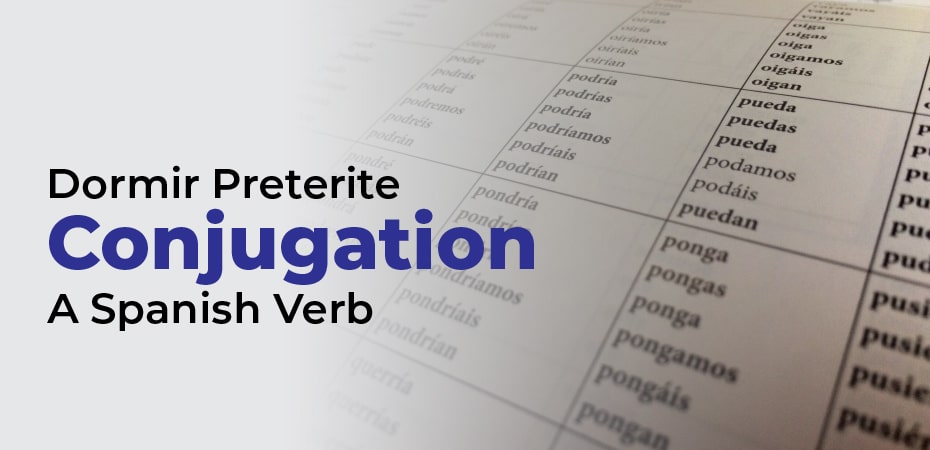Conjugation of Dormir: In general, to use a Spanish verb in a sentence, the ending of the verb should correspond to the subject. This process is called conjugation. A verb can be compared to a power tool, such as a drill, that has a variety of bits attached that you can use for different tasks. We will look at the example with the regular verb live (to live).
Changing the spelling of sleep is more difficult than just changing its ending. Sleep is a stem-changing verb, so you have to modify more than the spelling. The stem of the verb changes to use for most conjugations. It would be like switching out your battery for a power plug to use the drill. This is essentially the same tool with the same parts, you just had to add a little bit to the drill for the task at hand. Let’s take a look.
Dormir belongs to the first group of irregulars -ir verbs that show a pattern. The term includes sleep, lie, part, feel, serve, sort, and all their derivatives, such as deal. It is common for all of these verbs to drop the last letter of the radical (root) in the singular form. The singular form of sleep is je dors (not “m”), and the plural form is nous dormons (which retains the “m” from the root). You will be more likely to remember conjugations if you can recognize these patterns.

Do You Use the Verb Dormir Regularly?
The French verb dormir (“to sleep”) is one of the most common -ir verbs. Verbs ending in -ir share conjugation patterns with another important set of irregular verbs. A pattern of irregular -ir verbs can be seen in sleep, which lies within the first group.
Dormir is a male or female name?
It is both for masculine and feminine. It is true that the word for ‘man,’ homme, is masculine.
Intro of Dormir:
The verb. A person who sleeps (first-person singular present indicative: durmo, past participle: dormido) (transitive) to let oneself sleep, to be asleep (to fall asleep in a state of reduced consciousness). Quito!
Dormir Conjugation:
I think there is no other time in life when one misses sleep more than when a new life has been added to the family. A good way to understand sleep in context is to look at an example. Suppose you are visiting your friend Mariana who has just given birth to her first child. Mariana’s sleep patterns have changed since she became a mother, and you both want to talk about it.
There are some patterns to irregular -ir verbs. There are two groups that share similar traits and conjugation patterns. There is a fourth, large category of extremely irregular -ir verbs that have no pattern.
The majority of French verbs ending in -mir, -tir, or -vir are conjugated this way. Examples include:
- Dormir > to sleep
- Endormir> to put/send to sleep
- Redormir> to sleep some more
- Rendormir> to put back to sleep
- Départir> to accord
- Partir> to leave
- Repartir> to restart, set off again
- Consentir> to consent
- Pressentir> to have a premonition
The Sleep Conjugation Preterite:
Preterit refers to events that took place in the recent past or in the immediate past. The verb sleep is regular in the Preterite tense for all pronouns except the plural and singular third person. The -o to -u shift occurs in these pronouns.
A Few Examples of Dormir:
It can be helpful to see how sleeping is used in phrases, as in these examples, which show the French phrase followed by the translation in English.
- Avoid sending sleep> to feel sleepy or to feel like sleeping
- Dormir d’un sommeilprofond / lourd / de plomb / to sleep deeply or fast, to be asleep, to be in a deep sleep
- Dormir à poingsfermés – to be fast asleep or to be sleeping like a baby
Learn these conjugations and examples and soon you’ll be sleeping soundly the night before a French language test or meeting with a French-speaking friend.

